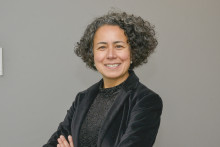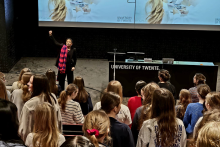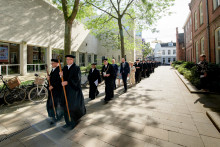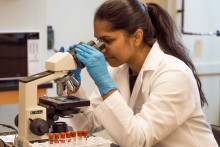The professor moved her work and her ‘KocerLab’ to the UT in July, after twelve years at the University of Groningen. ‘I like to do both fundamental and applied research,’ she says. ‘Here everybody understands that. They all know what I’m talking about. I really like the mentality at the UT.’
Doors to the cell
Armagan Kocer’s field of expertise is membrane proteins and ion channels – terms not often used by non-biologists, but luckily the scientist is used to that and knows how to simplify her complex research. ‘Every cell in our body has walls. The proteins I’m interested in are the doors and windows in these walls, they are the channels through which the cell communicates with the outside. If they don’t function properly, it leads to many problems, including brain diseases and cancer.’
The scientist focuses on the ion channels that are known to be important and tries to understand them. ‘Once I know how they work, I try to use them for different purposes,’ she says. These include, for instance, targeted drug delivery or early disease detection. ‘We can engineer channels and use them as biosensors that can sense even a single molecule of a disease in the body. That way we don’t have to wait until the disease markers are in high concentration to diagnose it.’
Finding the right channels
Looking into these possible applications were part of Kocer’s work in the past. Now she has a new mission in mind. ‘I want to find out how to stop cancer metastases. Most patients with cancer don’t die from the primary tumor, but due to metastases of that tumor. If we know which channels are crucial for the tumor cell to metastasize, we can design molecules to stop that function.’
Detecting diseases and stopping cancer. All noble causes, but Kocer says she is in science mostly because of her own curiosity. ‘I need to know how things work! Curiosity is like a disease and there is no cure for me,’ smiles the professor. ‘Honestly, that is why you do this job. You don’t do it for money. You do it because you are curious. But I like the results of my curiosity to be useful, otherwise it is very selfish.’
professor armagan kocer
2019 – now Full professor of Bioelectric Signaling and Engineering, the Faculty of Science and Technology at the University of Twente
2016-2019 Associate Professor at UMCG, Department of Neurosciences
2014-2016 Assistant Professor at UMCG, Department of Neurosciences
2014-2015 ERC Proof of Concept Grant
2013-2014 ERC Proof of Concept Grant
2009-2014 Assistant Professor at University of Groningen, Department of Biochemistry
2007-2014 ERC Starting Grant
2007-2012 NWO Vidi Grant
2007 Post-doc at University of Groningen, Department of Biochemistry
2001-2007 Scientist at Bioorganic Materials and Devices (non-academic)
2000 PhD in Biology at the Middle East Technical University (Turkey)
‘Equal for everybody’
Armagan Kocer was hired for the female-only Hypatia chair, designed to increase the number of female professors at the UT. Was this the reason why she relocated here? ‘I would have applied no matter what the specific chair was. I never got anything just because I’m a woman,’ she says. ‘But this was a good opportunity for me, because I wanted to switch to a different university and becoming a professor was the next step. Usually universities search for tenure trackers at the start of their career, while I was already at the last stage.’
Gender equality and female representation are important topics for Kocer, though. ‘It is still true that women face many disadvantages. I’d like to make academia equal for everyone. I have a daughter who wants to become a scientist and I want the academic environment to be good by then.’







